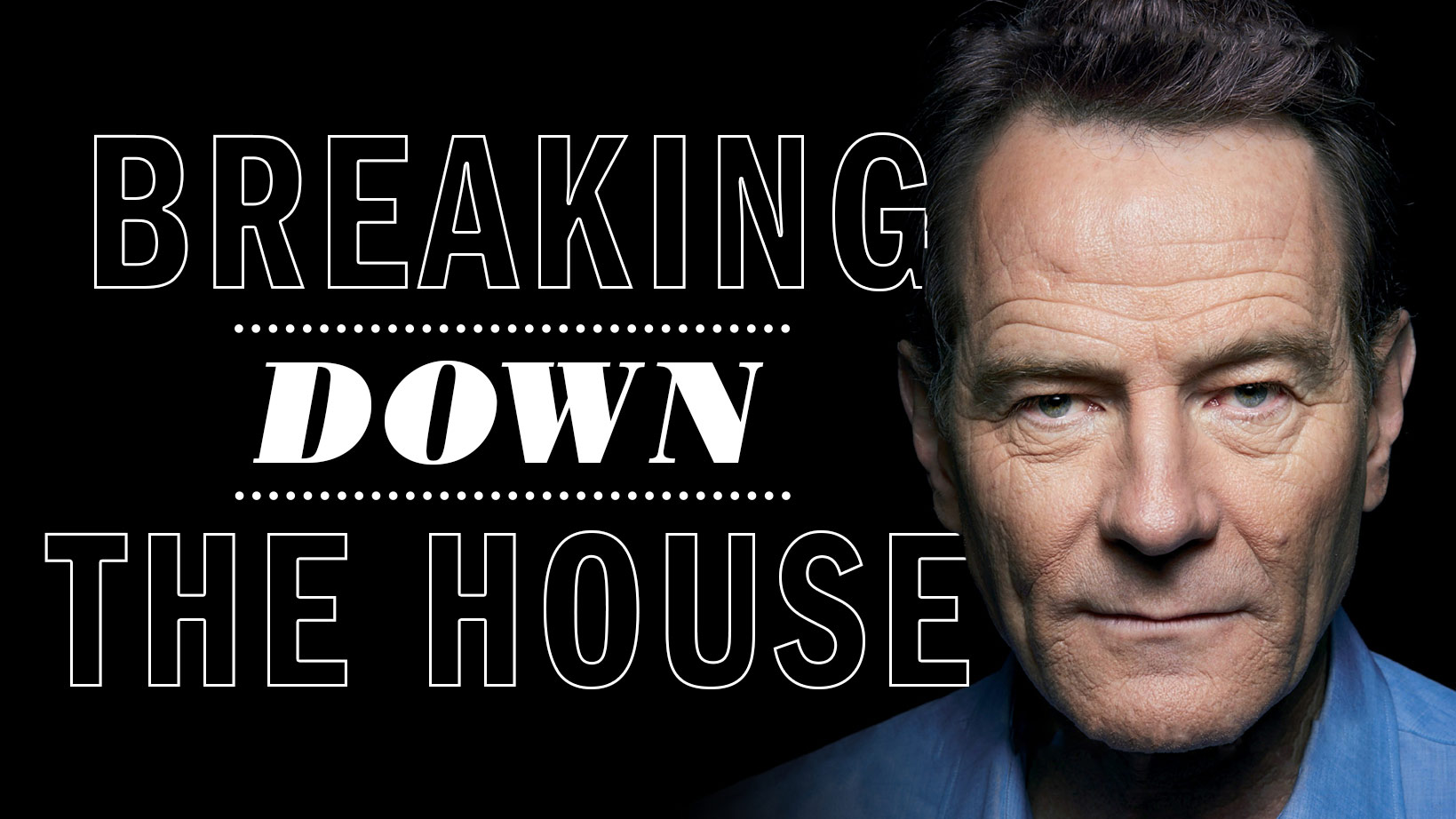Bryan Cranston first decided to be an actor just a few miles away from the University of Virginia, while cruising the beautiful Blue Ridge Parkway on a cross-country motorcycle trip with his brother.
Four decades later, Cranston – now 61 and an award-winning actor best known for playing drug kingpin Walter White in the hit TV series “Breaking Bad” – returned to Virginia and took the stage at John Paul Jones Arena on March 26 for the annual UVA President’s Speaker Series for the Arts. Joined by “Breaking Bad” producer and UVA alumnus Mark Johnson, Cranston discussed his career and the impact of the arts.
Addressing a packed house at John Paul Jones Arena, the award-winning actor reflected on the many iconic performances of his 40-plus-year career – not only playing White, but also Hal, the hapless dad on “Malcolm in the Middle”; jokey dentist Dr. Tim Whatley on “Seinfeld”; and, more recently, President Lyndon B. Johnson in the play, “All the Way.” He also met with about 100 UVA drama students for a special Q&A session, which Cranston specifically requested in order to talk directly with students hoping to enter the entertainment business.
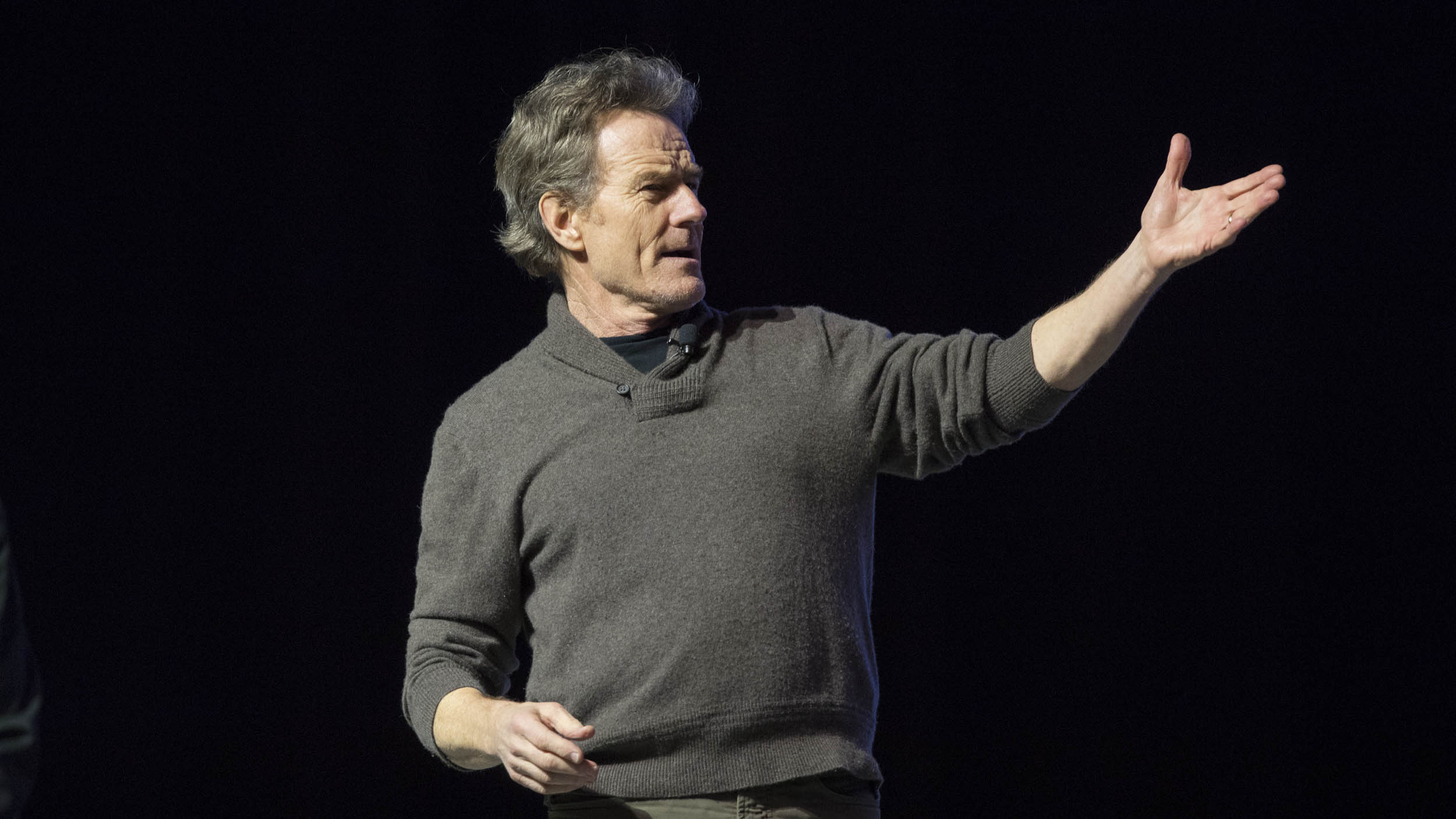
Cranston drew an appreciative crowd to John Paul Jones Arena, where he spoke about everything from his troubled childhood to how he almost missed his signature “Breaking Bad” role. (Photo by Sanjay Suchak, University Communications)
In each talk, Cranston – combining candor with his signature comedic timing – hammered home a few key themes, including the joy of storytelling, the importance of hard work and the undeniable role of luck in Hollywood.
Check out some of his insights and stories in the video above and his conversation with UVA Today, below.
Q. In your memoir, “A Life in Parts,” you recount a moment on the Blue Ridge Parkway when you and your brother were stranded during several days of rain. What happened and how did it change your life?
A. It was momentous in my life. I was 19 years old, right in the midst of figuring out who I was and what I wanted. I don’t think I would have had the same experience in a car. On a motorcycle, there are certain conditions, like rain, that you have to be concerned about. We had found this little park shelter, and there was no one else there for six days. It never stopped raining.
There is something about confinement that makes a person reflect, and I had the epiphany that a career is more than just pursuing something you may be good at; it’s about pursuing something that you love to do. For me, that was the distinction.

Thousands filled the lower portion of John Paul Jones Arena, eager to catch a glimpse of the actor. (Photo by Sanjay Suchak, University Communications)
Q. Though the characters you have portrayed are very different, each of them has quirky, complex and often unexpected personalities. What draws you to these characters and how do you choose your roles?
A. A few of us – a fortunate few – are able to become storytellers. For me, choosing my characters is an extension of the story. Is it an important story? Is it thrilling and compelling? Does it make a statement? Does it resonate with me and stay with me after I read it?
If the story and the writing are solid, I look at the character. Is the character germane to the plot? Is it something I can see myself doing? Does it scare me a bit? If it does, that’s often a good sign.

UVA alumnus Mark Johnson, a decorated producer who worked on “Breaking Bad,” joined Cranston on stage. (Photo by Sanjay Suchak, University Communications)
Q. You’ve had to do some pretty crazy things in the name of acting, whether rappelling down a building for a commercial or wearing a “suit of bees” as Hal on “Malcolm in the Middle.” What have been some of the most memorable stunts you pulled off?
A. On “Malcolm in the Middle,” the conditions were right for those kinds of stunts, because of the nature of the character and the genre of comedy. There were tremendous opportunities to be naked and covered in blue paint, strapped to the front of a bus, covered with bees, hung upside down, or any number of other things. I didn’t want to do anything that wasn’t part of the story, just for the sake of doing a stunt. But I’m willing to go wherever the storytellers want me to go.
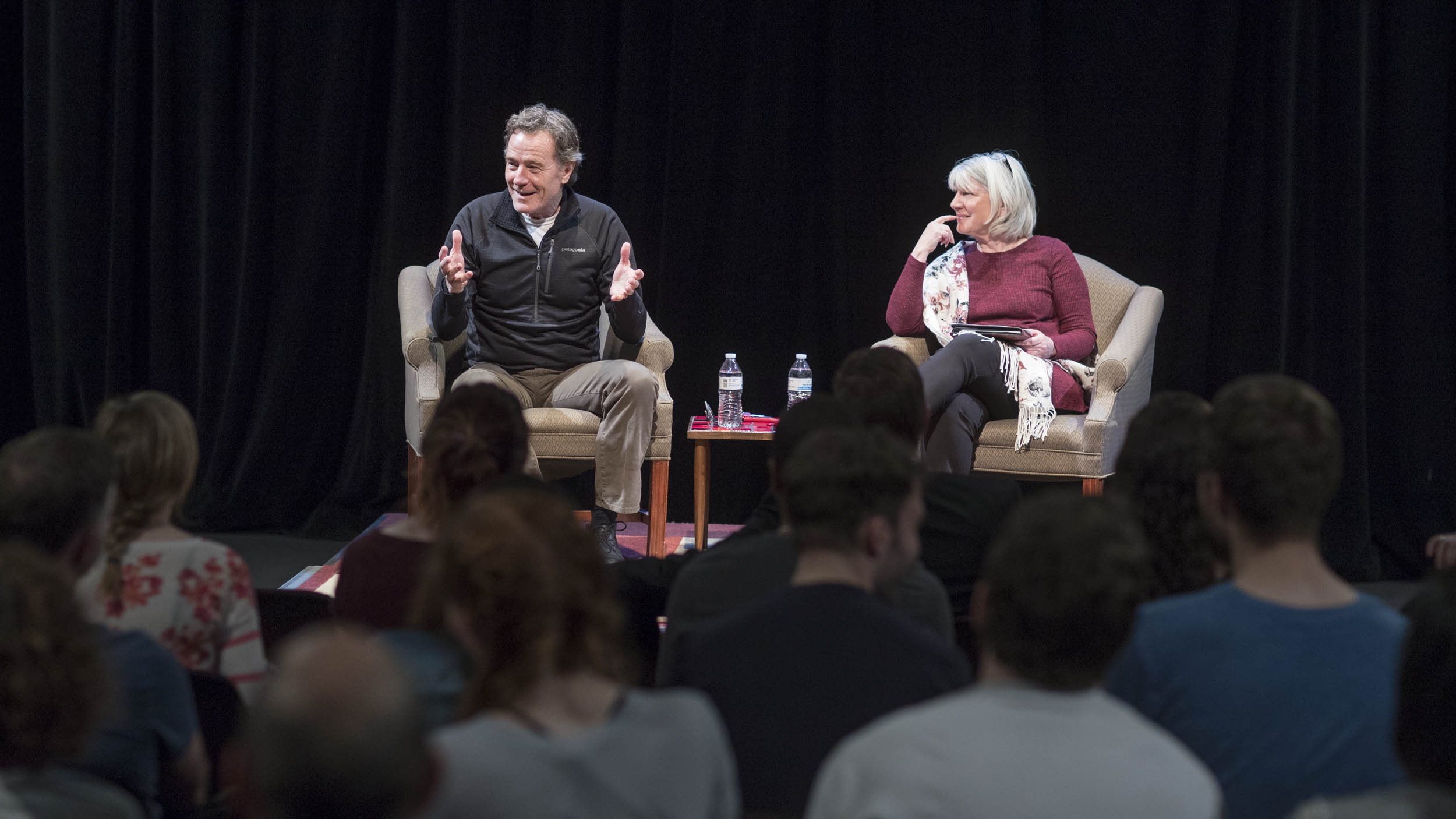
The day before taking the stage at John Paul Jones Arena, Cranston held a more intimate Q&A session for UVA drama students, sharing advice for breaking into the entertainment business. (Photo by Sanjay Suchak, University Communications)
Q. Has it been difficult to shake off the persona of Walter White, who was such a morally ambiguous character?
A. No, it hasn’t affected me. Human beings are filled with idiosyncrasies and characteristics that are both positive and negative. In a dramatization, you accentuate those, but it still has to be believable and honest. There has to be a verisimilitude in the performance and the show itself, and that is what people bought into with “Breaking Bad.”
After the show, I gave myself a three-year moratorium on television and went into theater instead. I was able to step away and do other things, and that opened up new opportunities.
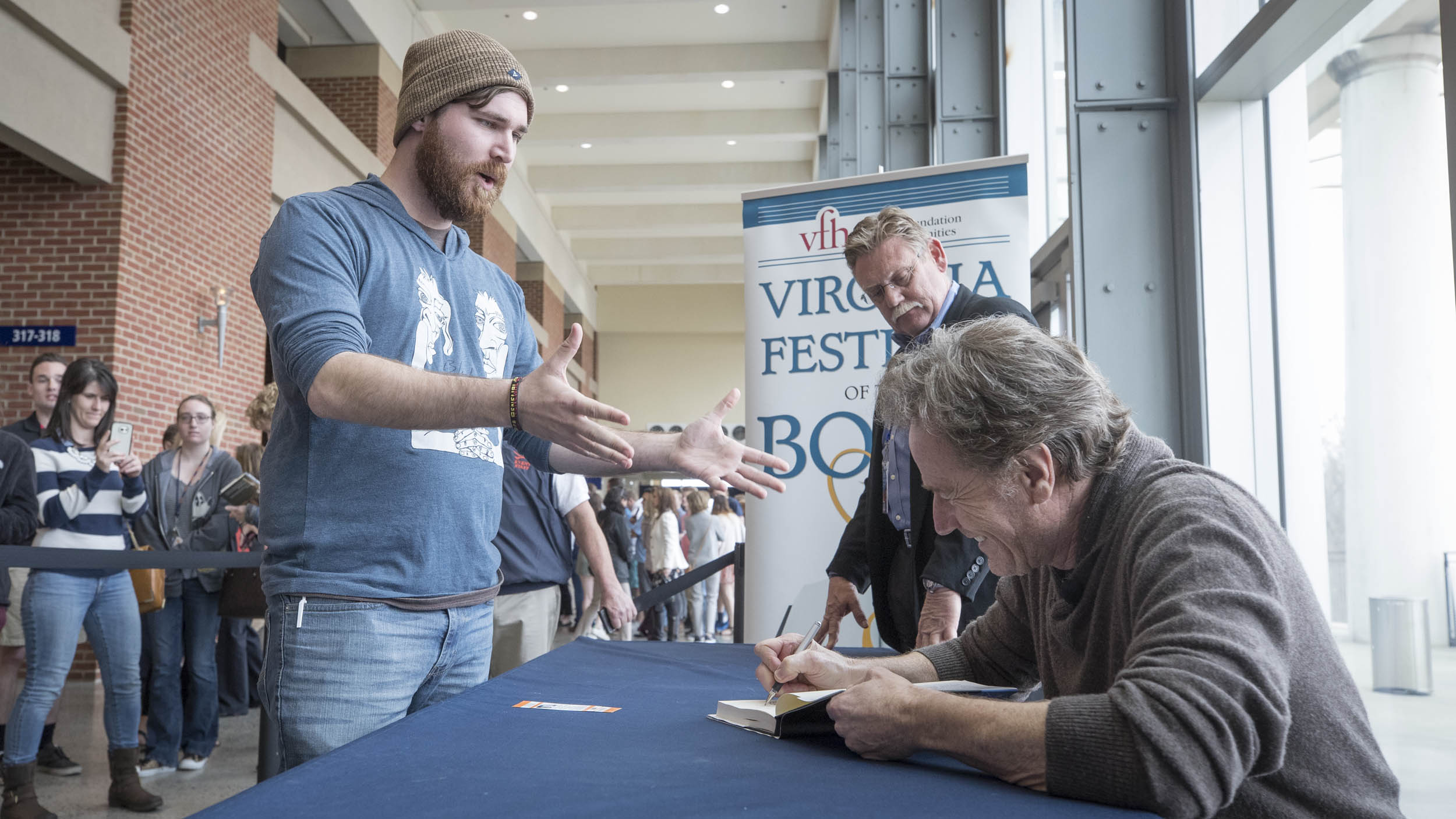
After his talk, Cranston signed copies of his new memoir, “A Life in Parts.” (Photo by Sanjay Suchak, University Communications)
Q. What types of roles are you most interested in now?
A. I’m interested in anything that excites me. I’m no different than any other human being in the sense that our first recollection is dragging a book to our parent’s lap and saying, “Tell me a story.” Everyone still wants to be told a story, whether they are 2 or 102. I’ll ask myself if I want to be part of the storytelling, and if the answer is yes, then I’ll jump in. I feel very lucky that I am able to do that.
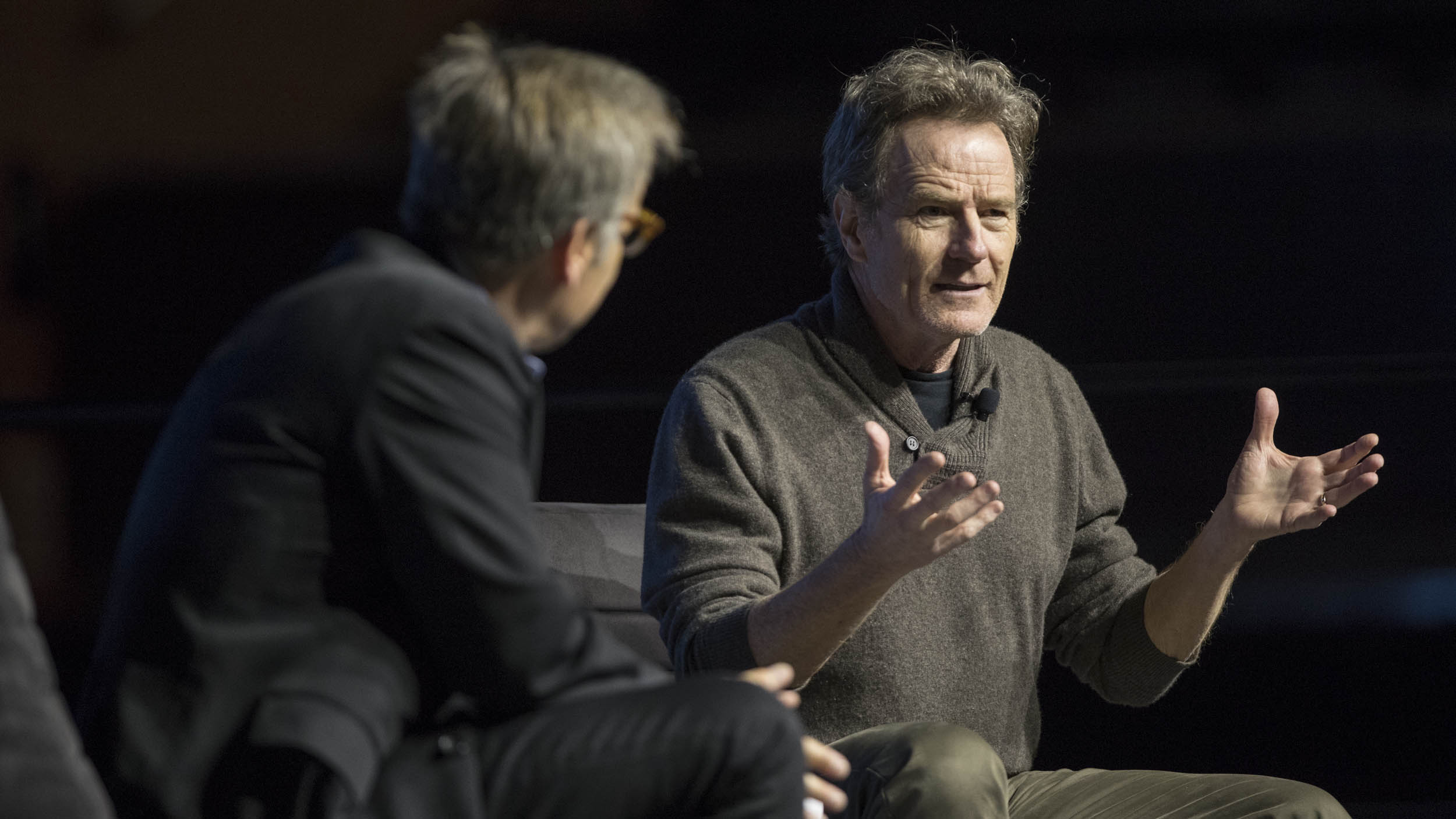
Ultimately, Cranston did exactly what he advised his audience to do; he told a great story. (Photo by Sanjay Suchak, University Communications)
Q. Discussing your early acting career, you wrote, “Whenever I felt I was one of the best actors in a class, I left to find another one where I wasn’t.” How did that approach benefit you, and what other advice do you have for UVA students as they pursue various career paths?
A. For me, I would say, think about what empowers you. Figure out what makes you feel powerful, strong, accomplished, loved and respected. What makes you feel those great things? You could find that in your personal life – in your marriage, in being a parent, in charity work, in your religion – or in the arts or athletics or any number of other things. Find the thing that empowers you and pursue that. If you do it that way, you can’t guarantee happiness, but it is the pursuit of happiness that is important.
Media Contact
Article Information
March 23, 2017
/content/qa-he-heads-uva-7-questions-breaking-bad-star-bryan-cranston

